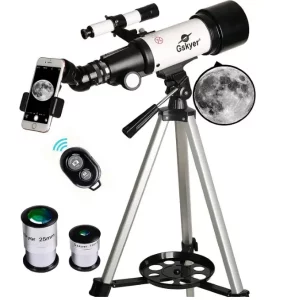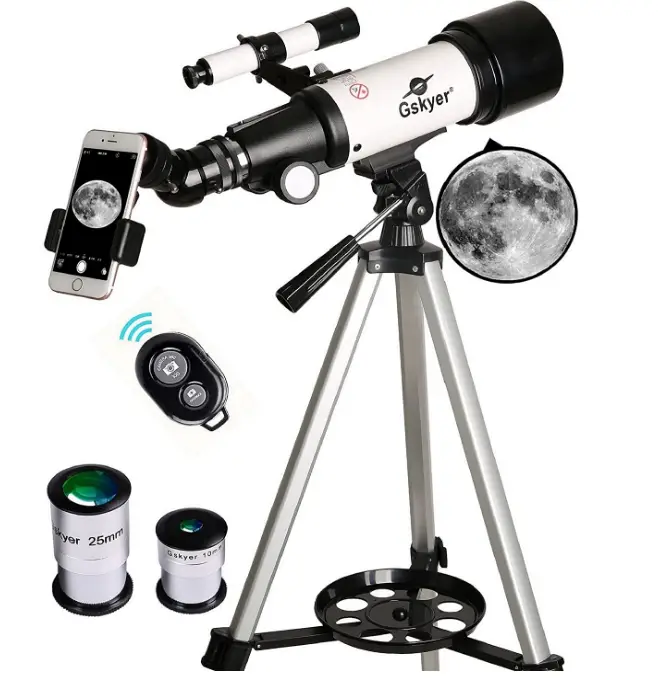

Gskyer Telescope, 70mm Aperture 400mm AZ Mount Astronomical Refracting Telescope

Specifications
- PRODUCT DIMENSIONS: 24.8 x 4.92 x 8.46 inches
- ITEM WEIGHT: 5.7 pounds
- BRAND: Gskyer
- EYE PIECE LENS DESCRIPTION: Barlow
- Objective Lens Diameter: 70 Millimeters
- TELESCOPE MOUNT DESCRIPTION: Altazimuth Mount
- FOCUS TYPE: Manual Focus
- FINDERSCOPE: Reflex
- LENS COATING DESCRIPTION: Fully Coated
- FOCAL LENGTH DESCRIPTION: 400 millimeters.
Gskyer is a completely coated optics glass lens with high transmission coatings, with a focal length of 400mm (f/5.7) and a 70mm aperture, delivers breathtaking images and protects your eyes. Astronomers can use this telescope to study the stars and the moon. Two replacement eyepieces and one 3x Barlow lens are included in the package. Each eyepiece’s magnifying power is trebled with a 3x Barlow lens. Finding objects is simple with this 5×24 finder scope, which comes with a mounting bracket and cross-hair markings on the inside. It contains one smart phone adapter and one wireless camera remote, allowing you to simply explore the globe through the screen and capture beautiful heavenly photographs. With an adjustable aluminium alloy tripod and a carry bag, this telescope allows for many various viewing positions. The telescope and tripod can both fit within the bag for simple travel and storage.
What’s in the Box
- Gskyer telescope.
How to use Gskyer Telescope
Following the given steps to use the Gskyer telescope:
- Remove the tripod’s legs.
- To keep the extended legs in place, use a tightening screw.
- Spread out the other two legs in the same manner.
- To put the accessory tray together, start by aligning the notches.
- Then turn the knob clockwise to lock the tray tabs into the tripod brackets.
- Pull the thread cover out of the way.
- Combine the AZ Altazimuth Mount with the handle.
- Place the body tube in the appropriate location
- Tighten the set screw on the body tube.
- Insert the base of the finderscope into the body tube.
- Tighten the screw on the base of the finderscope.
- Slide the finderscope into the hole on the base by lowering the metal extending screw.
- Adjust the three screws on the base to center the finderscope in the hole.
- In the focuser, place the zenith mirror.
- On the zenith screw, tighten the screw.
- On the zenith screw, tighten the screw.
- In the zenith mirror, place a 25mm eyepiece.
- In the zenith mirror, place a 10mm eyepiece.
- In the zenith mirror, place a 5mm eyepiece.
- 3X Barlow lens installation
- In a 3X Barlow lens, place a 25mm eyepiece.
- In a 3X Barlow lens, place a 10mm eyepiece.
- In a 3X Barlow lens, place a 5mm eyepiece.
- 5n m 18. Remove the objective lens cover.
- In the zenith mirror, place a 5mm eyepiece.
- To clear the field, turn the focuser wheel. 3X LOW LENS 19. 3X Barlow lens installation
- Now you can use your telescope.
Frequently Asked Questions
- Is the Gskyer an excellent telescope for the money?
Gskyer makes the greatest and most widely used telescopes. Stargazing and watching faraway planets and stars are popular pastimes for many people. If you’re a beginner or a hobbyist astronomer, this Gskyer 70mm aperture travel telescope is a perfect choice. It has a 400mm focal length and a high-quality lens. - With a Gskyer telescope, what can you see?
The Gskyer Telescope has established itself as a high-end telescope. It is used by amateur and professional astronomers to observe deep space objects. With the telescope, you can easily observe the moon, star clusters, galaxies, and Saturn’s ring. - Is it possible to observe planets using the Gskyer telescope?
Gskyer is one of the most well-known telescope manufacturers. It will aid your understanding of planets, moons, and stars. This Gskyer telescope has a focal ratio of 5.7 and a 70mm aperture. - Is a 70mm telescope sufficient?
Beginners and intermediate astronomers alike will benefit greatly from a 70mm telescope. Almost all of the noteworthy objects in the night sky may be seen from the earth with a fair view. - What company manufactures GSO telescopes?
Despite its lack of recognition, Taiwan-based GSO is one of the world’s largest and most productive telescope firms. Guan Sheng Optical is the abbreviation for Guan Sheng Optical. - What kind of telescope does NASA employ?
The Hubble Space Telescope is a massive space telescope. Hubble was launched by NASA in 1990. Hubble is the length of a school bus. - Which telescope has the best field of view?
The Hubble Space Telescope has taken the world’s most distant photograph of the universe, revealing millions of galaxies billions of light-years away. extreme Deep Field, or XDF, is a composite of 10 years of Hubble telescope observations of a single area of sky. - With a Celestron AstroMaster 130eq, what can you see?
The Celestron AstroMaster 130 eq reflector telescope shows the Moon and planets in brilliant, clear images. Each of these great devices makes it simple to see Jupiter’s moons and Saturn’s rings. - What causes the blurriness in Barlow lenses?
The atmosphere of the Earth also has a role in restricting the maximum magnification you can employ. Heat radiating from the ground and adjacent structures, high altitude winds, and other meteorological conditions might cause your image to blur due to atmospheric instabilities. - Is it worthwhile to invest in Barlow lenses?
The Barlow lens should be considered by every amateur astronomer as a highly helpful tool. One of the most significant advantages of a 2x Barlow Lens, for example, is that it practically doubles the magnification of your eyepieces, effectively doubling your eyepiece collection.